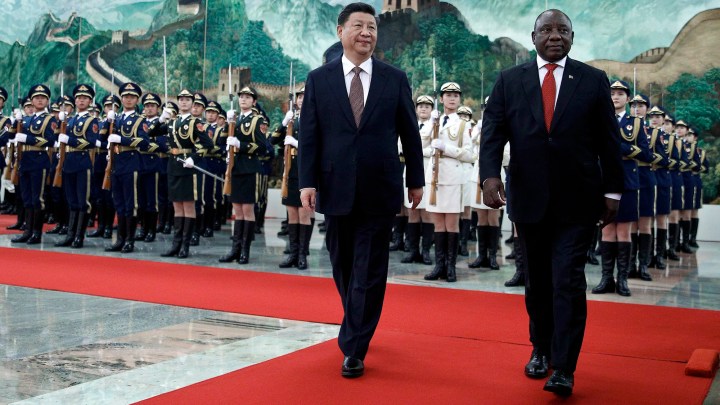BUSINESS REFLECTION
After the Bell: Balancing in a canoe with a dragon will demand dexterity from SA

There are many actual and potential negatives associated with the upcoming BRICS Summit, but one real potential positive: the opportunity for SA to examine its trade with China. But will SA’s politicians and diplomats seize the opportunity?
Last week it was announced that SA and China had struck trade agreements worth R41.5-billion. What the press release associated with the announcement did not specify, however, is that SA’s trade deficit with China is now reaching extreme levels. For years, the trade relationship between SA and China was mutually supportive. It was more or less in balance, and the deal was simple: SA sells China raw materials; China sells SA manufactured goods.
But two things have changed: SA has started importing more manufactured goods from China and has not managed to sell China more raw materials, not to mention manufactured goods. The reason for that is well known in SA: SA’s manufacturing sector has been decimated and its minerals sector has been static.
The disparity is now eye-popping. For example, according to Stats SA, in the first half of the year, SA exports to China were about $6.1-billion and its imports were about $11.3-billion. The roughly $2-billion in trade agreements announced last week will make a difference, but will still leave a pretty large deficit. This figure, by the way, is much less than Chinese statistics suggest the Asian giant is exporting to SA.
It’s not a huge issue since SA’s overall trade balance is now back to being roughly in balance, and has been for the past few years. Trade with Europe, both exports and imports, has increased slightly and was about 27% of the total in 2022. Imports from Europe and Africa into SA have decreased slightly over the past decade and are now 24% and 9%, respectively, of all imports into SA.
All in all, what this shows is exactly what you would expect: China is displacing trade from Africa and Europe. At the same time, it’s also replacing manufactured production within SA. The type of goods SA is importing from China is also interesting: it’s not textiles and children’s toys as you might guess; the biggest single category is machinery, which constitutes about half the total. I would bet a thumping great portion of that is PV panels and other solar equipment.
How do you change this trend? Well, the short answer is with difficulty. But SA does have some leverage at the moment because China is making a big effort to make friends and influence people as a consequence of its prickly relations with the US and Europe. In addition, African trade is only a small proportion of its total trade, so China can afford to be a little more generous. SA doesn’t have any kind of trade agreement with China, so there is a big target out there for the Department of Trade and Industry to hit.
On the other hand, China’s generosity is going to be tempered by growing economic problems at home. The massive rates of growth China has experienced over the past 30 years have evaporated, slowing its recovery, although when you are an economy the size of China, growth of 3% is still pretty good.
But the short version of what has happened in China is that its ability to grow through exports stalled about five years ago, so China sought to develop its internal market — a completely sensible decision of course. But that meant a huge investment into property, and debt levels are now extreme.
Izak Odendaal, an Old Mutual Wealth investment strategist, noted in his letter to clients this week, titled Red Dragon Blues, that last week, Country Garden (China’s biggest remaining private property developer) missed $22-million in interest payments on dollar bonds. It has another $1-billion in bond payments due in the next few weeks.
In addition, he points out, youth unemployment has increased sharply and is now at 21% — a record high for China — and gathering a lot of attention, with some analysts speculating it could be twice as high as reported last quarter. President Xi Jinping, ever the disciplinarian, has instructed young people to “eat bitterness” and find low-paying jobs. Imagine President Cyril Ramaphosa saying that to SA’s youth!
This is all a bit of worry for SA, given China’s new-found importance in SA’s economic life. But it’s also easy to overstate: consumption levels in China are still a fraction of what they are in the West, so there is still plenty of room to grow. Interestingly, Odendaal noted that while China’s steel imports have been exploding over the past few decades, they have plateaued over the past five years, although at a very high rate.
The German president Helmut Kohl once said that negotiating with the US was like trying to balance when you are in a canoe with an elephant. SA has the same challenge when dealing with China; it will require dexterity that we have not yet seen. DM

















So that’s one less economic model for the ANC to fawn over. What next? North Korea? Cuba? Probably Zimbabwe as the comrades take one last long lunch at the trough before it all goes belly up (pardon the pun).
South Africa is perfectly placed to benefit from the opportunities out there: we have strong, developed trade links with key western economies, which give our companies access to predictable markets for high value goods; through BRICS, we need to leverage greater exports to those large, growing economies (not so much Russia), that offer a counterpoint to our economic structure in terms of primary production and processed products from these sectors; we’re linked to the world’s fastest growing economies in sub-Saharan Africa, with AfCFTA imminent, opening up markets in East and West Africa to goods that have been successfully exported to SADC (almost R500bn last year); we have a trade agreement with Brazil and key economies in South America through the Mercosur agreement, although it’s not comprehensive or complementary to the relative strengths of the countries involved; finally, the Middle East, with its huge wealth and massive appetites for food, beverages, vehicles, and other consumer goods, should provide us with a nice balanced global marketplace.
However, in order to benefit from these opportunities, we need a political elite that puts our economic and social priorities above the ideological interests of an increasingly emboldened lunatic fringe, for whom ordinary South Africans represent little more than collateral damage in their quest for a new world order – and one that would bring ruin to all, except for those pigs more equal than others.